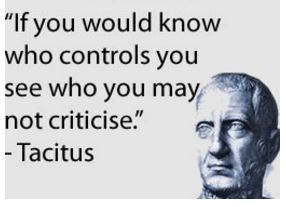
Well, things are getting interesting, aren’t they? I am not quite sure what to think about it all. If that video clip from the 9/11 ceremony had not surfaced, we would not even be having a discussion, much less breathless theories about insidious medical matters, body doubles and conspiracies. It is a bewildering world of smoke and mirrors out there, as puzzling as a pair of sunglasses with bright blue lenses.
To that end, I was going to run a piece this morning by noted Roman historian Tacitus on the developments out there on the campaign trail, the one in which both candidates are reporting to be in apple pie order, and fully ready to assume the responsibilities of the office to which they both aspire.
Or all four of them, for that matter, though I haven’t heard the blood pressure numbers for either the Libertarian or the Green candidates, though I do hope they are well. If you have not heard of them, the former was caught not knowing about a town in Syria, while the latter was filmed spray painting graffiti on a bulldozer.
I introduced you to Tacitus the other day; he and fellow Roman Empire essayist Arrias will be joining the Socotra home page with their own tabs to serve as click-bait for our media empire.

Tacitus has a distinct take on the matter at hand, and precisely what it could mean. Had I published it, the renowned Roman historian would have made his first appearance in the annals of The Daily. He has direct and pointed views about things, as befits a scholar and observer of the human parade for more than 2,000 years.
“Nothing new under the sun,” it has been said, and Tacitus has seen the empires rise and fall. It is not unrealistic to take the lessons of the history he has seen and apply them to the Good Ole U.S. of A. Kingdoms and Republics have a natural entropy to them, a steady or dizzying rise and then decline that can be abrupt or linger in a sickbed for decades.
I should let you know that Tacitus takes on the events of the day with an unflinching gaze. As you know, since the endless campaign started to get hyper-weird, I have moderated my public persona, since I am not sure which list of enemies I am going to wind up on once all the dust settles. As a natural-born Citizen of Rome, Tacitus is under no such constraints.
I am pretty sure Tacitus is not a Republican. As a young man, he studied rhetoric in preparation for a career in law and politics, and like his contemporary Pliny, he may have studied under the Spanish rhetorician Quintilian. He started his career as a lawyer under the riegn of Vespasian, but switched to public service as a Quaestor (Latin for investigator) under Emperor Titus.
He and his property survived Domitian’s reign of terror (AD 81–96), but the experience left him jaded and perhaps ashamed at his own complicity with the atrocities and corruption of the era.
Domitian, in the words of Tacitus: “(left) no interval or breathing space of time, but, as it were, with one continuous blow, drained the life-blood of the Commonwealth…”
So, I suppose it would be fair to term Tacitus crusader for virtue, and there doesn’t appear to be a party these days that endorses that concept. The essay this morning will be the last we see for a couple weeks, since the Ancient Roman has adapted to modern America, and is taking his SUV for a spin across the continent.
A disclaimer up front, at the advice of our attorneys, and it will remain in effect for the duration. Read this quickly, like the disclaimer at the end of the ads for exciting news drugs that “can cause giddiness, vomiting or sudden acute collapse.” There are no acknowledged members of the GOP on the editorial staff. The most we can get out of them is that they are dyspeptic Independents. The views of Tacitus do not necessarily reflect those of the management of Socotra House LLC, its stockholders, dependents or hangers-on. The opinions expressed are those of an ancient Roman who has seen it all before, and lived to tell the tale. Today, he turned his attention to the medical arts. There is a pointed reason for that, as I am sure you are aware.
To give some context, the medical profession has come a long way from classical Rome. The ‘doctors’ back then were not nearly as highly regarded as they are now. The medical profession itself, outside those assigned to the Legion, was considered at best a blue-collar trade, fit for slaves, freedmen or non-Latin citizens. Mostly Greek, in fact. They were largely self-taught or apprenticed practitioners who put out their shingle as healers. Sort of like bloggers today.
Considering what is going on out there, it is possible that they had it about right in those days. Anyway, after some minor construction work at the print plant, we will be ready to launch Tacitus on an unsuspecting public.
Copyright 2016 Vic Socotra
www.vicsocotra.com
